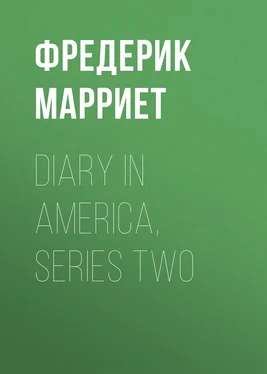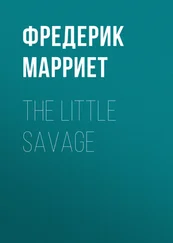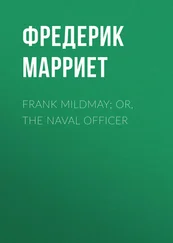Фредерик Марриет - Diary in America, Series Two
Здесь есть возможность читать онлайн «Фредерик Марриет - Diary in America, Series Two» — ознакомительный отрывок электронной книги совершенно бесплатно, а после прочтения отрывка купить полную версию. В некоторых случаях можно слушать аудио, скачать через торрент в формате fb2 и присутствует краткое содержание. Жанр: Путешествия и география, История, literature_19, foreign_edu, foreign_antique, foreign_prose, на английском языке. Описание произведения, (предисловие) а так же отзывы посетителей доступны на портале библиотеки ЛибКат.
- Название:Diary in America, Series Two
- Автор:
- Жанр:
- Год:неизвестен
- ISBN:нет данных
- Рейтинг книги:3 / 5. Голосов: 1
-
Избранное:Добавить в избранное
- Отзывы:
-
Ваша оценка:
- 60
- 1
- 2
- 3
- 4
- 5
Diary in America, Series Two: краткое содержание, описание и аннотация
Предлагаем к чтению аннотацию, описание, краткое содержание или предисловие (зависит от того, что написал сам автор книги «Diary in America, Series Two»). Если вы не нашли необходимую информацию о книге — напишите в комментариях, мы постараемся отыскать её.
Diary in America, Series Two — читать онлайн ознакомительный отрывок
Ниже представлен текст книги, разбитый по страницам. Система сохранения места последней прочитанной страницы, позволяет с удобством читать онлайн бесплатно книгу «Diary in America, Series Two», без необходимости каждый раз заново искать на чём Вы остановились. Поставьте закладку, и сможете в любой момент перейти на страницу, на которой закончили чтение.
Интервал:
Закладка:
Конец ознакомительного фрагмента.
Текст предоставлен ООО «ЛитРес».
Прочитайте эту книгу целиком, на ЛитРес.
Безопасно оплатить книгу можно банковской картой Visa, MasterCard, Maestro, со счета мобильного телефона, с платежного терминала, в салоне МТС или Связной, через PayPal, WebMoney, Яндекс.Деньги, QIWI Кошелек, бонусными картами или другим удобным Вам способом.
1
Miss Martineau in her work speaks of that most delightful of all conveyances—an American stage-coach; but Miss M is so very peculiar in her ideas, that I am surprised at nothing that she says. I will, however, quote the Reverend Mr Reid against her:—
“I had no sooner begun to enter the coach than splash went my foot in mud and water. I exclaimed with surprise. ‘Soon be dry, sir,’ was the reply; while he withdrew the light; that I might not explore the cause of complaint. The fact was, that the vehicle, like the hotel and steam-boat, was not water-tight, and the rain had found an entrance. There was, indeed, in this coach, as in most others, a provision in the bottom, of holes, to let off both water and dirt; but here the dirt had become mud, and thickened about the orifices, so as to prevent escape. I found I was the only passenger; the morning was damp and chilly; the state of the coach added to the sensation; and I eagerly looked about for some means of protection. I drew up the wooden windows; out of five small panes of glass in the sashes three were broken. I endeavoured to secure the curtains; two of them had most of the ties broken, and flapped in one’s face. There was no help in the coach, so I looked to myself. I made the best use I could of my garments, and put myself as snugly as I could in the corner of a stage meant to accommodate nine persons. My situation just then was not among the most cheerful. I could see nothing; every where I could feel the wind drawn in upon me; and as for sounds I had the calls of the driver, the screeching of the wheels, and the song of the bull-frog for my entertainment.”—Rev. Mr Reid’s Tour, vol. I, page 100.—Very delightful, indeed!
2
This spirit of accommodation produces what would at first appear to be rudeness, but is not intended for it. When you travel, or indeed when walking the streets in the Western country, if you have a cigar in your mouth, a man will come up—“Beg pardon, stranger,” and whips your cigar out of your mouth, lights his own, and then returns yours. I thought it rather cool at first, but as I found it was the practice, I invariably did the same whenever I needed a light.
3
The railroads finished in America in 1835 amounted in length to 1,600 miles; those in progress, and not yet complete, to 1,270 miles more. The canals completed were in length 2,500 miles, unfinished 687 miles.
4
Every steam-boat has its bar. The theatres, all places of public amusement, and even the capitol itself; as I have observed in my Diary.
5
It was not a bad idea of a man who, generally speaking, was very low-spirited, on being asked the cause, replied, that he did not know, but he thought “that he had been born with three drinks too little in him.”
6
I was once conversing with one who was formerly very popular with the democrats, but who was likely to be outset by another demagogue, who “went the whole hog,” down to the Agrarian system. “Captain,” said he, with his fist clenched, “I’m the very personification of democracy, but I’m out-Heroded by this fellow. The emigrants are a pack of visionaries, who don’t know what they want. The born Americans I can deal with, but with these newcomers democracy is not sufficient; they want a mobocracy, and I suppose we must have it.”—“You have it now,” replied I.—“Well, captain, I believe you’re right.”
7
I don’t know why, but there is no scrutiny of the votes in American elections, or if there be, I never heard of one being made.
8
“The young men of New England migrate in large numbers to the west, leaving an over proportion of female population, the amount of which I never could learn. Statements were made to me, but so incredible that I withhold them. Suffice it, that there were more women than men in from six to nine States in the Union.”—Miss Martineau.
9
To give the reader some idea of the price of European articles in the Western country, I will mention cloth. A coat which costs 4 pounds in England, is charged 7 pounds 10 shillings at New York; and at Cincinnati, in the West, upwards of 10 pounds.
10
Some of the invented calumnies against me found their way to this country. I consider the contents of this chapter to be a sufficient refutation, not only of what has been, but of what will in all probability be hereafter asserted against me by the American press.
11
This chapter was in the press, when a paragraph, cut out of the Baltimore Chronicle, was received from an anonymous hand at New York. Whether with a friendly intention or otherwise, I am equally obliged to the party, as it enables me to further prove, if it were necessary, the vituperation of the American press.
“Many persons in our country had an opportunity of becoming acquainted with the Captain. The fast-anchored isle never gave birth to a more unmitigated blackguard . His awkward, unwieldy misshapen body, was but a fair lodging for a low, depraved, licentious soul. Although liberally educated, he seemed insensible to any other enjoyments than those of sense. No human being could in his desires or habits approach more near to the animal than him. No gentleman ever sat down with him an hour without a sensation of loathing and disgust. ‘What kind of man is Captain Marryat?’ was once asked in our presence of a distinguished member of Congress, who had sojourned with him at the White Sulphur Springs. ‘He is no man at all,’ was the reply, ‘he is a beast.’”
This is really “going the whole hog” himself, and making me go it too. Now, if I receive such abuse for my first three volumes, in which I went into little or no analysis, what am I to expect for those which are about to appear? To the editor of the Baltimore Chronicle I feel indebted: but I suspect that the respectable portion of the American community will be very much annoyed at my thus giving his remarks more extensive circulation than he anticipated.
12
Miss Martineau talks of Dr Follett as one of the greatest men in America. I was surprised at this, as I never heard of his name, so I inquired—“Who is Dr Follett?”—“I don’t know.”—“Do you know Dr Follett?”—“Never heard of him.”—“Do you?”—“No.” I asked so many people that at last I became quite tired; at last I found a man who knew him, his answer was—“Oh, yes; he’s an Abolitionist !” As the American critic justly observes, “He shines in the future pages of his grateful guest.”
13
The International Copyright Question.
One of the most important questions, upon principle, that ever was mooted, has for some time placed in juxtaposition the various editors of the corps critical, accordingly as their interests or feelings have been worked upon. Our chief object in these remarks is to hold up to the scorn and derision that it richly merits the assumption of an editor, that an author has no right to the emanations of his own mind—to the productions of his own pen. We do not mean to answer the many and gross absurdities—which this talented gentleman’s sophistry has palmed upon the public,—it would be a work of supererogation, inasmuch as his ‘airy vision’ has already been completely ‘dissolved’ by the breath of that eminent gentleman, well known to us, who has so completely annihilated the wrong which he is so anxious to continue. But the shameful assumption that a writer, universally allowed to be the worst paid artist in creation, should not have—is not entitled to have, by every principle—of courtesy and honour, a sole and undivided right to, and in, his own productions—is so monstrous, that every editor imbued with those feelings, which through life, should be the rule of his conduct, is in duty bound to come forward and express his dissent from such a doctrine, and his abhorrence of a principle so flagitious.
Читать дальшеИнтервал:
Закладка:
Похожие книги на «Diary in America, Series Two»
Представляем Вашему вниманию похожие книги на «Diary in America, Series Two» списком для выбора. Мы отобрали схожую по названию и смыслу литературу в надежде предоставить читателям больше вариантов отыскать новые, интересные, ещё непрочитанные произведения.
Обсуждение, отзывы о книге «Diary in America, Series Two» и просто собственные мнения читателей. Оставьте ваши комментарии, напишите, что Вы думаете о произведении, его смысле или главных героях. Укажите что конкретно понравилось, а что нет, и почему Вы так считаете.












